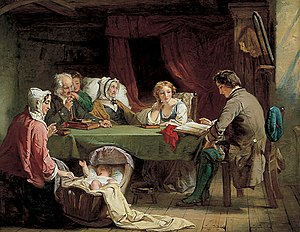
Blue laws (also known as Sunday laws, Sunday trade laws, and Sunday closing laws) are laws restricting or banning certain activities on specified days, usually Sundays in the western world. The laws were adopted originally for religious reasons, specifically to promote the observance of the Christian day of worship. Since then, they have come to serve secular purposes as well.
Blue laws commonly ban certain business and recreational activities on Sundays, and impose restrictions on the retail sale of hard goods and consumables, particularly alcoholic beverages.[1][2] The laws also place limitations on a range of other endeavors—including travel, fashions, hunting, professional sports, stage performances, movie showings, and gambling.[3][4] While less prevalent today, blue laws continue to be enforced in parts of the United States and Canada as well as in European countries, such as Austria, Germany, Norway, and Poland, where most stores are required to close on Sundays.[3][5][6][7][8]
In the United States, the Supreme Court has upheld blue laws as constitutional, recognizing their religious origins but are supported by secular justifications. This has resulted to the provision of a day of rest for the general population.[9][10] Meanwhile, various state courts have struck down the laws as either unenforceable or in violation of their states' constitutions. In response, state legislators have re-enacted certain Sunday laws to satisfy the rulings while allowing some of the other statutes to remain on the books with no intention to enforce them.[11][failed verification]
- ^ Seelye, Katharine Q. (November 20, 2012), "Where Pilgrims Landed, Thanksgiving Is Kept at Table, Not Mall", The New York Times, retrieved December 29, 2021
{{citation}}: CS1 maint: date and year (link) - ^ Leff, David K. (February 25, 2015). "Once Strict 'Blue Laws' Have Largely Faded". Hartford Courant. Retrieved December 29, 2021.
- ^ a b Hudson, David L. Jr. (August 2009). "Blue Laws". Freedom Forum Institute. Retrieved December 21, 2021.
- ^ Myers, Gustavus (1921). Ye Olden Blue Laws. University of California. Retrieved December 29, 2021.
- ^ Яна (December 20, 2018). "What shops in Austria work on weekends". Austria Today. Retrieved December 29, 2021.
- ^ Sullivan, Arthur (April 15, 2021). "Is it time Germany opened up its stores on Sundays?". Deutsche Welle. Retrieved December 29, 2021.
- ^ "Opening Hours in Norway". Visit Nordic. Retrieved December 29, 2021.
- ^ Sas, Adriana (April 25, 2021). "Sunday trading ban in Poland - Statistics & Facts". Statista. Retrieved December 29, 2021.
- ^ "McGowan Et Al. v. Maryland" (PDF). Library of Congress. May 29, 1961. Retrieved December 29, 2021.
- ^ "Two Guys from Harrison-Allentown, Inc., v. McGinley, District Attorney, Lehigh County, Pennsylvania, Et Al." (PDF). Library of Congress. May 29, 1961. Retrieved December 29, 2021.
- ^ Bunn, Rachel (May 22, 2019). "A quick overview of Pennsylvania's Blue Laws". Penn Live. Retrieved December 29, 2021.